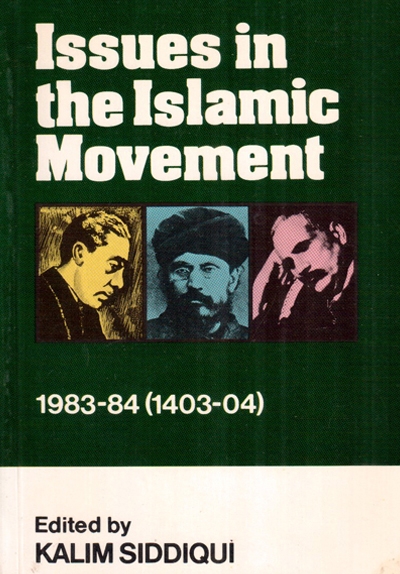Issues in the Islamic Movement 1983-84 (1403-04)

Author(s): Kalim Siddiqui
Publisher: The Open Press
Published on: Rajab, 1405 1985-04
ISBN: 0905081-29-3 (hbk.), 0-905081-30-7 (pbk.)
No. of Pages: 417
Foreword
by Kalim Siddiqui
This anthology, and the embryonic media from which it is compiled each year, represents a new mood in the world of Islam. As a group of writers we are still exploring some of the basic issues that must become better understood within the new paradigm of Muslim political thought. The outline of a new worldview of Islam are clear and reasonably well defined in this series of anthologies and elsewhere. The new mood in the Ummah and the new paradigm are only relatively new. Their origins go back to the jihad movements led by Uthman Dan Fadio in West Africa in the nineteenth century, and to the ideas of such men as Jamal al-Din Afghani. It is this mood that has found expression in the writings of many Muslim thinkers in this century. Most notable among these are the poet-philosopher Muhammad Iqbal in India, the sociologist Ali Shari'ati in Iran and Syed Qutb in Egypt. What has happened to Iqbal and Shari'ati should alert us to a danger that looms over all major thinkers. If a visionary, philosopher and thinker does not become part of a paradigm in his lifetime, he may well be hijacked and misrepresented by forces opposed to him.
Iqbal, it is true, foresaw 'the formation of [a] consolidated North-West Indian Muslim State' that appeared to him to be 'the final destiny of the Muslims, at least of North-West India'. Iqbal did not give a name to this 'final destiny' of the Muslims of North-West India. The name 'Pakistan' had been coined in London in 1929 by a group of Indian Muslims led by Choudhry Rahmat Ali. Iqbal, as far as is known, never used the term 'Pakistan' for the 'final destiny' he called for. Yet, in Pakistan's officially promoted political historiography, Iqbal is projected as the 'father of Pakistani nationalism'. He is also put on a pedestal as the 'national poet' of Pakistan. The present regime in Pakistan is trying to use Iqbal to justify its own preferences for a secular State that is also subservient to the United States of America.
In Iran since the Islamic Revolution the place of Ali Shari'ati is still uncertain. His portraits have gone up and down with the political fortunes of groups who have claimed him as their intellectual mentor. This is almost certainly as unfair to Ali Shari'ati as the treatment of Iqbal in Pakistan is to Iqbal. Syed Qutb's message remains largely ignored by the official Ikhwan leadership. Until the Islamic Revolution in Iran his books were sold and read throughout the Arab world, including Saudi Arabia, without causing offence to the regime. This shows that ideas by themselves can do little damage to the status quo. To be effective an idea must be part of a 'movement' and 'reality'.
This is why the total paradigm of Islam includes the Islamic State as well as the Qur'an and the Sunnah of Prophet Muhammad, upon whom be peace. This point is well understood by the rulers of Saudi Arabia, Egypt, Pakistan, Malaysia, the Sudan and all the other secular regimes in Muslim nation-States. Many of them distribute 'free' copies of the Qur'an throughout the world. They know that so long as the agencies distributing the Qur'an are themselves subservient, the Qur'an can do no harm to them, Such regimes have also brought large parts of tile 'Islamic movement' under their control and patronage.
The writers whose articles are included in this anthology are mostly those who believe that the new paradigm of Muslim political thought is incomplete without the Islamic State, In our view the Islamic State that has emerged from the Islamic Revolution in Iran is the only contemporary reality and movement that is part of the new paradigm. Why this is so is explained in my introduction to this volume, which is a paper I presented at a recent world seminar in London.
Kalim Siddiqui
The Muslim Institute
6 Endsleigh Street
London WC1H ODS
December 3, 1984
Rabi al-Awwal 8, 1405
